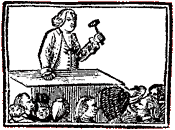Concord Instructs Its Representative, 1773
 Here’s one fruit of my visit to the American Antiquarian Society this month, apart from the hole in my rear bumper. In the United States Revolution collection there are a number of documents associated with James Barrett of Concord. One is his neighbors’ instructions to him after they chose him as their representative to the Massachusetts General Court. That document starts:
Here’s one fruit of my visit to the American Antiquarian Society this month, apart from the hole in my rear bumper. In the United States Revolution collection there are a number of documents associated with James Barrett of Concord. One is his neighbors’ instructions to him after they chose him as their representative to the Massachusetts General Court. That document starts:
To Capt. James BarrettAfter discussing two of the offending issues—royal salaries for judges and one of Parliament’s recent laws—the Concord letter winds up:
Sir
We his Majesties most Dutifull & Loyal Subjects the Inhabitants of the Town of Concord in Town meeting assembled this Eleventh Day of January 1773 after Expressing our most firm attachment to and ardent Love for our most Gracious Soverand King George, in the Support and Defense of whose Person and Dignity we are always ready not only to Spend our fortune But Lives, (whilst we are in the Injoyment of our Invaluable Priviliges Granted us by Royal Charter) But Cannot in this time of General Concern throughout the Province Do otherwise then Espress our Sentiments that Some of our Invaluable Priviliges are Infringed upon by those heavy Burdens unconstitutionally (as we think[)] already laid upon us that by Some Late Lawes and Inovations from home other of our Libertys and Priviliges Equaly Dear are in Danger of Being affected & Curtailed.
We therefore think Proper to Instruct you our Representative in the General assembley of this Province that you in a Constitutional Manner Endeaviour to Prevint those innovations we too Sencabley feel & those we fear by using your influence in the Present Sesson of the General assembly for an humble Remonstrance to his Majestiey that all those Voloations of our Rights and Priviliges which we are Justly Instilled too by the British Constitution and made over to us and Succesors by the Royal Charter may be Redresssed. . . .The letter was then signed by seven members of the committee.
Relying on your loyalty and Respect for his sacred Majesty your love & affection for your Countrey we trust that you will in all matters that may Come before you Conduct with that wisdom & Prudance that Integrity & Coolness that curcomspection & firmness which so well becomes the Senator & the Patriot
But the eighth member, Daniel Bliss, evidently objected to a phrase in the letter. The committee had warned that someone might be falsely accused under that new parliamentary law “out of Complasance to Some Court Sycophant.” That was too much for Bliss, a lawyer and friend of the royal government.
But town meetings tried to reach consensus on difficult issues, so the committee apparently worked out a compromise. They underlined that offending phrase and added the footnote “excepted to by D Bliss.” Then he squeezed his signature in among the rest.
This document has some other phrases crossed out and added, and those changes don’t look like the results of someone was copying a previous draft too quickly. Rather, this document appears to have been written out while the committee talked out what it should say. “‘In danger’ sounds better than ‘exposed’.” “Let’s move the salaries stuff down to here.” “‘Important’ or ‘exalted’?” It’s town government in action!
Special thanks to Boston 1775 reader Judy Cataldo for encouraging me to check out that A.A.S. collection.
TOMORROW: This very same document helps to solve a mystery. Well, a mystery for me, at least.

No comments:
Post a Comment